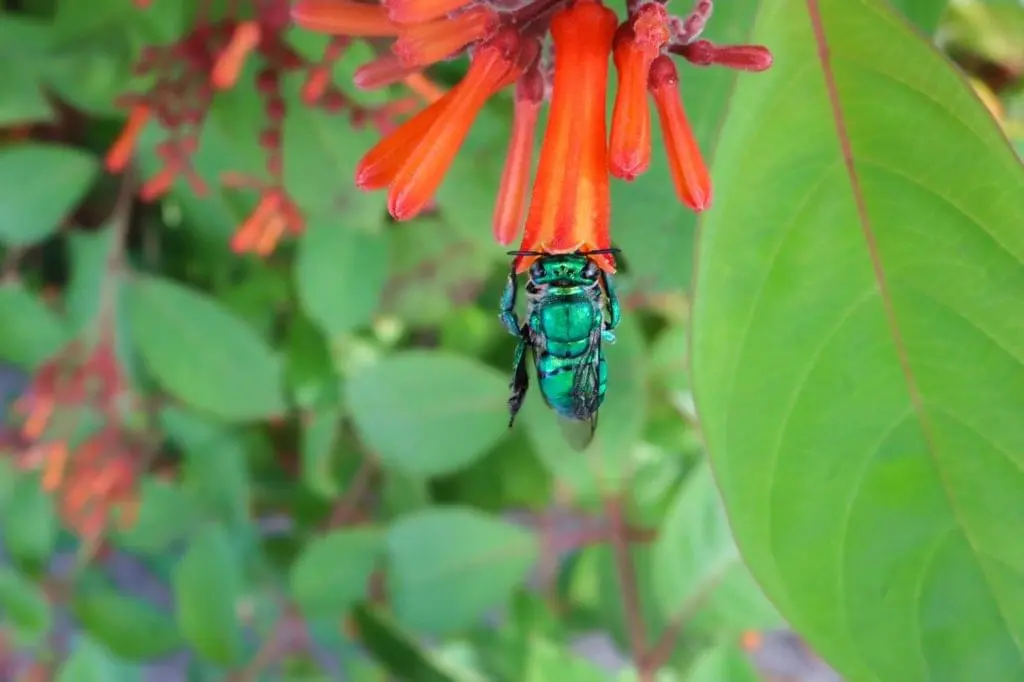by Amanda Rose Newton
The last week of June carries the special designation of National Pollinator Week, with celebrations geared towards our favorite winged friends happening countrywide.

The United States is such a diverse county with a dynamic variety of landscapes each with its own unique ecosystem that has its own niche of pollinators.
It seems appropriate to celebrate those hard-working pollinators right here on our own home turf and here are a couple of our most prized contributors to our continued food security, beautiful bouquets, and backyard entertainment.
1. Ruby-Throated Hummingbird (Archilochus colubris)
While 3 of the 338 species of hummingbirds pass through Florida each year, the Ruby-throated is the only one who builds nests to stick around for a while, making it more likely for you to spot it if you know where to look.
Prime nesting season is in April and they use lichens, moss, and even spider webs in constructing their walnut-sized homes. If you want to attract these guys, consider adding a feeder with 2 parts sugar to 1 part water along with the following red plants:
• Coral Porterweed (Stachytarpheta speciosa)
• Firespike (Odontonema stricta)
• Firebush (Hamelia patens)
• Scarlet Hibiscus (Hibiscus coccineus)
Remember, hummingbirds cannot smell, so the color is going to be your best bet for attracting these acrobatic flyers.
2. Sweat Bees (Halictidae spp.)
You have likely seen these on warm days, oftentimes getting a little too close for comfort!

True to their name, sweat bees love the electrolytes secreted by our skin and often swoop in to score an afternoon snack. Despite their boundary issues, sweat bees are fairly harmless, and spend the majority of their lives buzzing around the various flowers present in your garden.
A type of solitary bee, these do not make honey or live in colonies. Instead, you will find them nesting underneath the ground. To attract these jewel-hued beauties, try planting a few of the following:
• Frogfruit (Phyla nodiflora)
• Spanish Needles (Bidens alba)
• Dune Sunflower (Helianthus debilis)
• Seaside Oxeye Daisy (Borrichia frutescens)
3. White-lined Sphinx Moth
This moth looks and even sounds like a hummingbird intentionally! Many hummingbirds consume insects (one cannot live on sugar alone) so this costume helps avoid competition or being a quick bite for a predator.

Not shy by any means, this species is out around dusk making it easy to catch a glimpse without careful planning. To up the chances of a backyard encounter, consider adding a few of the following flowers to your garden bed:
• Tropical Sage (Salvia spp.)
• Blazing Star (Liatris spp.)
• Morning Glory (Ipomoea spp.)
• Coral Honeysuckle (Lonicera sempervirens)
4. Goldenrod Soldier Beetle (Chauliognathus pensylvanicus)
Consider yourself fortunate if you come across this beetle in the garden. Not only is it an incidental pollinator, but it also is a predator of many annoying pest species such as aphids.
Featuring beautiful orange leathery elytra and black dots, it screams fall and Halloween. Feeding on both nectar and pollen (for that added protein) they are not picky when it comes to what you have to offer. As the name suggests, they do have an affinity for all species of goldenrod, including our Florida native varieties.
• Goldenrod (Solidago spp.)
• Milkweed (Asclepias spp.)
• Sunflower (Helianthus spp.)
• Coneflower (Echinacea spp.)
5. Tachinid Flies (Tachinidae)
Flies are one of the most practical groups on planet Earth, occupying just about every ecological function available and becoming masters of their domains.
Tachinids, which are overlooked, perform a wide variety of services for us each day. They are large enough to be easily seen, and those who specialize as pollinators even take on the appearance of fuzzy bumble bees. They have a whole wardrobe of other costumes, including colors that range from brown to iridescent blue or green.
While nearly all adults are nectar feeders, the larvae are parasitoids of many pest species, especially caterpillars. If you want to bring in more of the good flies, here are a few plants to get you there:
• Sunflower (Helianthus spp.)
• Stokes Aster (Stokesia laevis)
• False Rosemary (Conradia canescens)
• Parsley (Petroselinum crispum)
If creating a pollinator-friendly garden has been on your mind, National Pollinator Week is the ideal time to start. For help planning your dream garden, seek out our free resources on pollinator gardening and we invite you to stroll through our gardens for inspiration.


